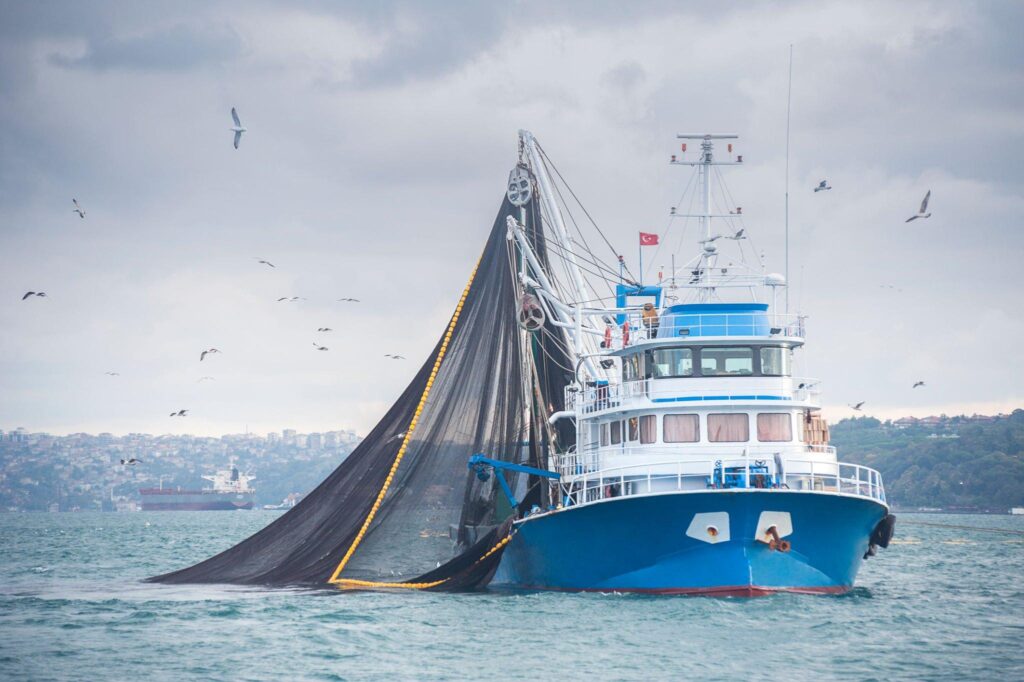With the sun reflecting off the water, a gentle breeze, and the thrill of a catch, owning a personal fishing boat can seem like a dream come true for many enthusiasts.
For some, it’s the allure of serene weekends spent on open waters, while for others, it’s the prospect of turning their passion into a business venture.
If you’re contemplating buying a fishing boat, one of the first questions you might ask yourself is, “Is a boat a good investment?” It’s not just about leisure; many wonder, “Is the fishing charter business profitable?”
In this article, I’ll delve deep into the waters of boat investments, exploring the financial waves and tides that come with such a decision.
So, Is a fishing boat a good investment? Yes, a fishing boat can be a good investment for the right person, depending on personal goals, intended usage, and financial situation.
Here are a few accessories that you may need when you fishing with a boat:
[amazon table=”3626″]

Table of Contents
- 5 Reasons Why Fishing Boat is a Good Investment
- Is owning a fishing boat expensive?
- Is buying a fishing boat a smart investment?
- Do fishing boats hold their value?
- What is the lifespan of a fishing boat?
- Is owning a fishing boat profitable?
- Return on Investment (ROI) Analysis
- Alternative Investments
- Making an Informed Decision
- FAQs
- Conclusion: Is Fishing Boat A Good Investment?
5 Reasons Why Fishing Boat is a Good Investment
- Income potential: If you plan to use your fishing boat for commercial or charter fishing, it can generate income and potentially provide a decent return on investment.
- Personal enjoyment: Owning a fishing boat can bring endless enjoyment and satisfaction, especially for avid anglers and outdoor enthusiasts.
- Cost savings: If you frequently rent or charter fishing boats, owning one can save money in the long run.
- Upgrade potential: A well-maintained fishing boat can be upgraded or resold, possibly at a profit.
- Asset diversification: A fishing boat can diversify your investment portfolio and hedge against economic uncertainty.
Is owning a fishing boat expensive?
Yes, owning a fishing boat can be expensive. The costs include the initial purchase, ongoing maintenance, insurance, fuel, storage, and other expenses. It’s crucial to budget accordingly and understand the financial commitment involved.
Is buying a fishing boat a smart investment?
Yes, buying a fishing boat can be a smart investment if you have a clear plan for its usage and are prepared to cover the costs associated with ownership. Researching the market and consulting with experts can help you decide wisely.

Do fishing boats hold their value?
Yes, fishing boats can hold their value, particularly if they are well-maintained and built by reputable manufacturers. However, the depreciation rate varies based on age, usage, and maintenance.
What is the lifespan of a fishing boat?
A fishing boat can last for decades if properly maintained and cared for. Regular maintenance and prompt repairs can significantly extend the lifespan of a fishing boat.
Is owning a fishing boat profitable?
Yes, owning a fishing boat can be profitable for commercial or charter fishing. The income generated from these activities can offset ownership costs and potentially provide a return on investment.
Read more: How Much Does A Fishing Boat Weigh
Return on Investment (ROI) Analysis
Commercial Fishing
Income potential: The demand for fish and seafood products can translate into significant income for commercial fishing ventures.
Market trends: Understanding the market and staying current on trends can help commercial fishers stay competitive and profitable.
Licensing and regulations: Navigating the complex world of fishing licenses and regulations is crucial to operating a profitable commercial fishing business. Ensuring compliance with local, state, and federal laws can protect your investment and maintain your eligibility for fishing rights.
Recreational Fishing
Personal enjoyment and satisfaction: Owning a fishing boat for recreational purposes can provide countless hours of relaxation and enjoyment on the water. This personal satisfaction can be difficult to quantify in monetary terms but is a significant factor to consider when assessing the investment.
Potential to upgrade or resell: A well-maintained fishing boat can be upgraded or resold, possibly at a profit. This can enhance the boat’s value over time and contribute to a positive return on investment.
Cost savings from renting or chartering: If you frequently rent or charter fishing boats, owning one can save money in the long run. These cost savings can help offset the initial investment and ongoing expenses associated with boat ownership.
Charter Fishing
Income potential from clients: Charter fishing offers the opportunity to generate income by providing fishing experiences for clients. This can be profitable if there is sufficient demand in your area and you can establish a positive reputation.
Seasonal demand and location: The success of a charter fishing business depends on factors like location and seasonal demand. Understanding the local market and selecting an optimal location can increase the likelihood of generating a positive return on investment.
Alternative Investments
Fractional Boat Ownership
Pros and cons of shared ownership: Fractional boat ownership allows multiple individuals to share the costs and responsibilities of owning a fishing boat. This can significantly reduce the financial burden but may also limit access to the boat and create potential conflicts among co-owners.
How it works and associated costs: Fractional ownership involves splitting the purchase price, maintenance, storage, and other costs among multiple owners. Each owner has a predetermined share of the boat’s usage and equity.
Boat Clubs and Memberships
Benefits of joining a boat club: Boat clubs and memberships offer an alternative to boat ownership by providing access to a fleet of boats for a monthly or annual fee. This can be a cost-effective solution for those who enjoy boating but do not want the financial commitment of ownership.
Membership fees and inclusions: Boat club fees vary depending on the club and membership level. It’s essential to carefully review the inclusions, such as boat access, reservation policies, and additional costs like fuel and insurance.
Rental Options
Renting a fishing boat can be an affordable short-term solution for those who want to enjoy fishing without the long-term commitment of boat ownership. Rental costs typically include the boat, safety equipment, and sometimes a guide or captain. This can be a viable alternative for occasional anglers or those wanting to try different boats before investing.
Making an Informed Decision
Assessing personal goals and financial situation: To determine whether a fishing boat is a good investment, it’s crucial to evaluate your personal goals, financial situation, and intended usage.
Conducting thorough research on the fishing boat market: Understanding the market, including trends, pricing, and popular models, can help you make an informed decision.
Consulting with experts and experienced boat owners: Speaking with professionals and experienced boat owners can provide valuable insights and advice on boat ownership and potential returns on investment.
Weighing the pros and cons of investing in a fishing boat: Assess the potential benefits and drawbacks of investing in a fishing boat to determine if it aligns with your goals and financial situation.
Read also: Does Fishing Boat Need Insurance?
FAQs
Can you write off a fishing boat as a business expense?
Yes, if you use your fishing boat for business purposes, such as commercial or charter fishing, you may be able to deduct certain expenses associated with boat ownership. Consult a tax professional to understand your situation’s specific tax implications and requirements.
Is a fishing boat an asset?
Yes, a fishing boat is considered an asset. It can be included in your financial portfolio and may appreciate or depreciate depending on factors such as age, condition, and market trends.
How do I choose the right fishing boat for my needs?
Choosing the right fishing boat depends on your intended usage, personal preferences, and budget.
how much do fishing charter captains make?
On average, fishing charter captains in the U.S. might earn anywhere from $30,000 to $100,000 or more annually, with many factors influencing this range. It’s also worth noting that some captains might operate only part-time or seasonally, which would affect their total annual earnings.
What is the cost of a fishing trawler?
The cost of a fishing trawler can vary widely based on factors like its size, age, condition, features, and region of purchase. On average, smaller used trawlers can start from $100,000, while larger, newer models or commercial-grade trawlers can exceed several million dollars. It’s essential to consult specific boat dealers or brokers for the most current and localized pricing.
Is Owning A Fishing Charter Boat Profitable?
Yes, Owning a fishing charter boat can be profitable, but success depends on various factors like location, demand, marketing, and managing costs. A popular destination with consistent demand and effective marketing strategies can lead to a profitable venture.
Conclusion: Is Fishing Boat A Good Investment?
The decision to invest in a personal fishing boat can undoubtedly prove to be a smart choice for many enthusiasts. The idea of buying a fishing boat might initially seem daunting, but when analyzed in terms of long-term benefits and potential profitability, it becomes clear that a personal fishing boat can indeed be a good investment.
For those passionate about fishing, owning a personal boat opens up a world of possibilities.
The convenience of setting sail whenever you desire, exploring diverse fishing spots, and having complete control over your fishing experience is truly unparalleled.
While there’s an upfront cost involved in purchasing a fishing boat, the return on investment comes in the form of unforgettable memories, enhanced leisure time, and the potential for a thriving business venture.
Moreover, if you’re considering delving into the fishing industry as a potential income source, the success of the fishing charter business can be a testament to the fact that such an endeavor can be genuinely profitable.
Chartering your boat to fellow fishing enthusiasts can not only help offset the initial investment but can also turn into a substantial revenue stream over time.
